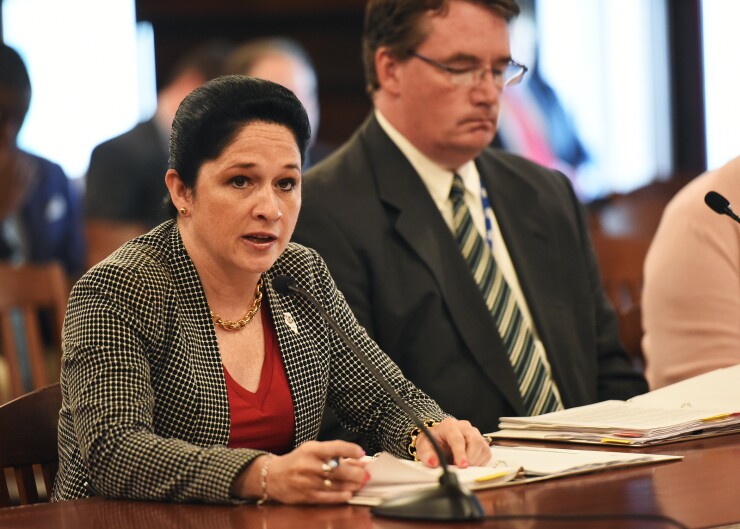CHICAGO – A fiscally distressed Chicago suburb took another stab at settling with its public safety pension funds and a group of revenue bondholders to free up state-collected revenue being diverted to cover overdue pension obligations.
Lawyers for Harvey and the other stakeholders in the case – including revenue bondholders who recently entered the fray -- appeared before Cook County Circuit Court Judge Raymond Mitchell Thursday.

They agreed to delay any action and return to court Monday to see if the pension funds and bondholders are amendable to the city’s latest settlement offer after rejecting one earlier in the week.
“We’re close,” Harvey’s attorney Bob Fioretti, of Fioretti Roth, told the judge.
If they reject the new proposal, Harvey is expected to seek a temporary restraining order blocking the distribution of funds being intercepted by state Comptroller Susana Mendoza’s office.
“We hope that we resolve this; the safety of the city’s citizens are our main concern,” Fioretti said. Mayor Eric Kellogg made deep cuts to the city’s police and firefighters’ ranks when the comptroller began withholding revenues – about $2 million so far. “The mayor would like to bring some back if we reach the kind of solution here.”
The comptroller began earlier this year enforcing the state law that allows police and firefighter funds outside Chicago to seek the diversion of revenues if they go through a certification process with the office. The provision was included in a 2011 public safety pension funding law that required actuarial contributions sufficient to reach a 90% funded ratio by 2040.
Harvey faces a growing sense of urgency to reach a settlement because the comptroller’s office is expected to complete its review of the police pension fund’s certified request, which would set the stage for the office to begin sending the withheld $2 million to the police fund to cover part of its $7 million judgment. The firefighters' fund is separately seeking $11 million from Harvey.
The withholding has triggered
Holders of Harvey’s 2008A, $6 million issue of hotel-motel sales tax and sales tax revenue bonds ifor a failed hotel and conference center have entered the fray. The project was never completed and the city faced Securities and Exchange Commission sanctions for misleading investors by diverting the proceeds for operations.
The bondholders filed a third-party complaint this week seeking to limit the pension fund claims after the comptroller halted monthly transfers of sales taxes to the bond trustee as required under the city’s 2008 bond ordinance.
The parties have divergent interests. The police fund argues its claim is superior to the firefighters' claim because it was submitted first. The firefighters' fund contends the statute in question is vague and does not prioritize claims, so the revenues should be shared. The bondholders believe they hold the superior claim that has been in place since 2008.

A February bond interest payment was made ahead of the pension funds’ submission of certified claims, but an August payment is at risk because monthly payments to the trustee were suspended by the comptroller after January, said Brent Vincent, a partner at Bryan Cave Leighton Paisner, who represents trustee Amalgamated Bank of Chicago.
“I don’t know that they are considering the bondholders” in their review of the pension certification, Vincent said during the court hearing, referring to the comptroller’s review.
The bondholders are seeking “recognition” of their “superior rights” in any settlement, he added. “We need this recognition.”
The attorney for the police fund expressed frustration at the potential for a delay in the distribution of revenue. “You can understand the frustration my clients have” given their original legal judgment is years old and they believed the intercept would result in payment this year, said Michael Moirano, of Moirano Gorman Kenny LLC.
The firefighters' fund disputes the police fund's position that it should be paid first, saying the two funds need to discuss “how the allocation would work between” the two boards and that the issue could end up the subject of litigation.
“There’s some disagreement now,” said Andrew Schwartz, of Schwartz & Kanyock LLC, who represents the firefighters' fund. He contends the 2011 law does not define priority status on pension fund claims. “We are making this up as we go along” because the statute “doesn’t really cover the situation as well as it should,” he said.
Lawyers from Attorney General Lisa Madigan’s office, which represents the comptroller, stressed that the required certification review of the police fund’s request was slated to be completed Monday but the office was not expected to release the funds until later in the week and that disbursement of the $2 million would not occur all at once.
The parties agreed to an order Thursday requiring the comptroller to notify lawyers for the funds and bondholders when the review is completed and the first scheduled disbursement date so they could seek court action to contest it.
Fioretti, the attorney for Harvey, believes “the bondholders have a statutorily stronger interest” than the pension funds. The city’s position that bondholders have a priority claim on the sales taxes is part of its lawsuit challenging the diversion.
Harvey’s suit argues that the city’s property can’t be garnished to satisfy a judgment under state law; that the funds are needed for critical services; that a portion is pledged to bondholders with greater rights than the pension fund; and that future levies have been appropriated to meet the judgment.
The diversion prompted a back-and-forth in the courts as Mitchell originally rejected the preliminary injunction. An appellate court overturned the judge’s decision but the Illinois Supreme Court on April 26 vacated the appellate ruling and sent the matter back to the circuit court for a hearing.





